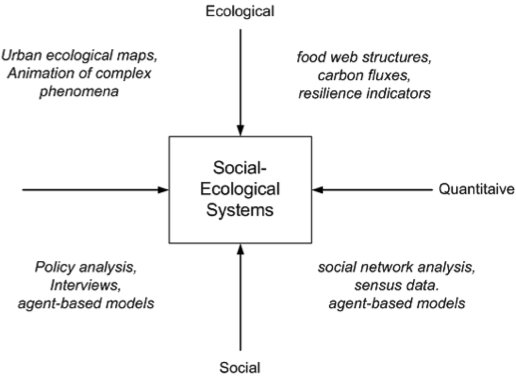SES Modelling and Visualisation Lab
The Modelling and Visualisation Lab facility at the Stockholm Resilience Centre provides a research facility for several research groups within and potentially also outside the centre
The laboratory aims to provide support and stimulate research and innovation by integrating social and ecological approaches, as well as combining qualitative and quantitative methods. It also aims to develop methods for cutting-edge research in some selected areas where we perceive synergies between the currently applied Information and communications technologies and social-ecological system (SES) research.
To achieve this, the lab serves as a "hub" connecting a set of research groups facilitating new transdisciplinary research approaches. These include for example combining different quantitative methods to study SES from experiments to network analysis to dynamic modeling to generate a multi-faceted understanding of SES. It is also a place for mutual learning and exchange of experiences in modeling SES.

The Lab aims to integrate social and ecological data and combine qualitative and quantitative methods to increase scientific understanding of social-ecological systems.
Designated IDRISI Centre
The lab has, by Clark Labs at Clark University in USA, been designated to be one of a few official IDRISI Resource Centres in the world.
IDRISI is a GIS software that handles both vector and raster based GIS. It can also be used for import and analysis of remotely sensed data in many formats. IDRISI also offers spatial statistical functions.
The assignment includes:
- Free IDRISI software at campus
- Courses will be given with regular intervals
- Beta version testing
- Support from Clark Labs for developing own modules
- Modules can be produced by Clark Labs on demand
Projects
The lab is involved in SRC research projects where programming/databases/data analysis/modeling/GIS plays a significant role. The criterias for selecting research projects for lab involvement are as follow (one or several should apply):
- The project involves a high level of technical complexity
- The end product developed, or the technological solution used, should be of interest outside the project as well (i.e. it should benefit a broader SRC-audience).
- There should preferably be spill over effects, such as for example a course or seminar, or a database for broader use.
- The involvement of the lab in the project should help to develop new knowledge and understanding of new technologies and how these can be used for SRC's research in social-ecological systems.
Projects can also be selected for lab involvement based on synergies with and links to other lab projects
Products
MatrixGreen - Landscape Ecological Network Analysis Tool MatrixGreen supports network-based (or graph theoretical) analyses of fragmented landscapes. Read more about MatrixGreen here
JmatrixNet
JMatrixNet is a small java programme that provides functionality to identify network of habitat patches in landscapes. Read more about JMatrixNet here
SENAnalyzer (Social-Ecological Network Analyzer)
SENAnalyzer (Social-Ecological Network Analyzer) is a simple java application that can be used to analyze a social-ecological system as a social-ecological network. Read more in the user manual Pdf, 150.6 kB.. The programme can be downloaded here
Pdf, 150.6 kB.. The programme can be downloaded here Zip, 402.6 kB..
Zip, 402.6 kB..






